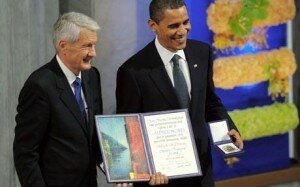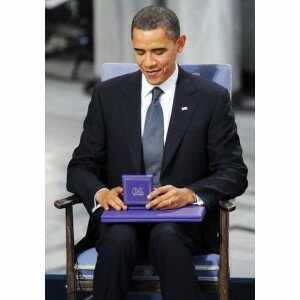 President Barack Obama accepted the Nobel Peace Prize in Oslo by conceding that others were more deserving and then mounting a passionate defence of “just wars” such as the conflict in Afghanistan.
President Barack Obama accepted the Nobel Peace Prize in Oslo by conceding that others were more deserving and then mounting a passionate defence of “just wars” such as the conflict in Afghanistan.
“We must begin by acknowledging the hard truth that we will not eradicate violent conflict in our lifetimes,” Mr Obama said in a speech that was notable for his uncharacteristically muscular rhetoric and unapologetic tone.
“There will be times when nations – acting individually or in concert – will find the use of force not only necessary but morally justified.”He even suggested that “war is at some level an expression of human feelings”.
Mr Obama, who was greeted at the Oslo City Hall by a fanfare of trumpets, was acutely aware that many Americans view his acceptance of the award, for which he was nominated just two weeks into his presidency, with amusement and even derision.
A CNN poll found that just 19 per cent of Americans believed he deserved the prize and 43 per cent thought he was unlikely ever to deserve it.
Before the speech, the audience of 1,000 listened to a performance from Esperanza Spalding, an American bassist and singer, and then gave a slightly uncomfortable-looking Mr Obama a standing ovation that lasted more than a minute.
When the award was announced two months ago, a bemused White House had to battle claims from the Right that Mr Obama was being rewarded by Scandinavians for apologising for past American actions.

US President Barack Obama takes a peek at his medal during the Nobel Peace Prize award ceremony at City Hall in Oslo, Norway
Now, Mr Obama is under fire from the Left after announcing last week that he would bolster the American pressure of 68,000 troops in Afghanistan with another 30,000.
Mr Obama responded by saying that he was accepting the award with “great humility” and acknowledged that his “accomplishments are slight”. While the US was “in the midst of two wars” the one in Iraq was winding down.
“The other [in Afghanistan] is a conflict that America did not seek; one in which we are joined by forty three other countries – including Norway – in an effort to defend ourselves and all nations from further attacks.”
There were even echoes in the speech of his predecessor President George W. Bush, who spoke of an “axis of evil” confronting the United States after the September 11th terrorist attacks of 2001.
Although he invoked the names of Mahatma Gandhi and Martin Luther King, he also emphasised “I cannot be guided by their examples alone” because he was an American commander-in-chief with a duty “to protect and defend my nation” against real threats.
“I face the world as it is, and cannot stand idle in the face of threats to the American people. For make no mistake: evil does exist in the world. A non-violent movement could not have halted Hitler’s armies.
“Negotiations cannot convince al-Qaeda’s leaders to lay down their arms.
To say that force is sometimes necessary is not a call to cynicism – it is a recognition of history; the imperfections of man and the limits of reason.”
Addressing European scepticism about war in general and US actions in particular, he said: “I raise this point because in many countries there is a deep ambivalence about military action today, no matter the cause.
At times, this is joined by a reflexive suspicion of America, the world’s sole military superpower”.
Mr Obama’s remarks were only occasionally punctuated by applause, such as when he stressed that the US “must remain a standard bearer in the conduct of war” and renewed his promise to close the Guantánamo Bay prison in Cuba.
“We lose ourselves when we compromise the very ideals that we fight to defend,” he said in a reference to controversial interrogation practices under Mr Bush. “And we honour those ideals by upholding them not when it is easy, but when it is hard.”
There was silence as he alluded to the blanket anti-war sentiments and anti-Americanism of many in Europe.
“In many countries there is a deep ambivalence about military action today, no matter the cause. At times, this is joined by a reflexive suspicion of America, the world’s sole military superpower.”



